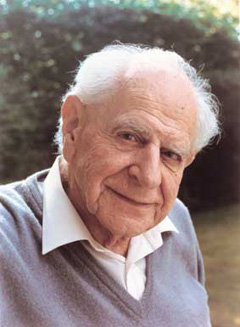Karl Popper is a modernist philosopher who created his own theory of critical rationalism. One of his most important points is the rejection of classical empiricism, which he considers to have too little credibility. He also states that scientific theories should be rationally criticized (if they have empirical content), and should be subject to tests which may refute them. He also states that knowledge is comprised of three worlds. The first world is the physical world, which is reality and physical perception. The second world is made up of subjective personal perceptions, experiences, and cognition. It is what we think about the world as we try to map, represent, and anticipate or hypothesis in order to maintain our existence in an every changing place. Personal knowledge and memory form this world, which are based on self-regulation, cognition, consciousness, dispositions, and processes. The third world is the sum total of the objective abstract products of the human mind. It consists of such artifacts as books, tools, theories, models, libraries, computers, and networks. It is quite a diverse mixture. While knowledge may be created and produced by World 2 activities, its artifacts are stored in World 3. There are various relations between these worlds. World 1 drives and enables world 2 to exist, while world 2 tries to control and regulate world 1. World 2 produces world 3, while world 3 helps in the recall and the training, education, development and learning of world 2. World 3, however, describes and predicts world 1, while world 1 is the inferred logic of world 3.







